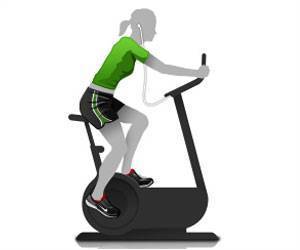Working out regularly won’t only help the fairer sex keep off those extra pounds, but as it turns out it will also reduce the risk of heart disease post menopause.
Working out regularly won’t only help the fairer sex keep off those extra pounds, but as it turns out it will also reduce the risk of heart disease post menopause.
The finding is based on a study by researchers at Temple University’s College of Health Professions, who found that aerobic exercise significantly decreased the chemical imbalances that can lead to heart disease and stroke.According to researchers, regular exercise of moderate intensity appears to reduce oxidative stress through an adaptive process that increases antioxidant activity.
Oxidative stress occurs when oxidants, harmful chemicals that damage tissue and cells, outnumber antioxidants in the body.
“Regardless of your hormone replacement therapy status, regular physical activity is a good way to not only decrease postmenopausal symptoms, but also to reduce the risk of cardiovascular disease, the leading cause of death of American women,” said study co-author Nicola Fenty-Stewart, Ph.D., also with Temple’s College of Health Professions.
“The similar response of the two groups suggests that aerobic exercise training is a powerful therapy that can potentially serve as a way for women to observe the beneficial effects of exercise,” she said.
Taking part in the study were 48 sedentary postmenopausal women, 21 of who were on Hormone Replacement Therapy (HRT) and 27 who were not.
Advertisement
Since changes in habitual dietary intake could influence oxidative stress levels, qualified subjects were stabilized for six weeks on the American Heart Association Step I diet, which is low in saturated and trans fat, and rich in fruits, vegetables, whole grains and fat-free and low-fat dairy products, Brown said.
Advertisement
The HRT users and non-users both experienced an 11 to 18 percent drop in plasma thiobarbituric acid reactive substances, an indicator of oxidative stress.
There were also decreases in body mass index and total body fat, and a significant increase in VO2 max (maximal oxygen uptake or aerobic capacity) in both HRT users and non-users after the exercise intervention, Brown said.
“Exercise was able to reduce oxidative stress levels in these women regardless of whether or not they were using estrogen replacement. In addition, the women did not lose large amounts of body weight or fat,” Brown said.
“No one is too old to begin an exercise program, but it is imperative to consult your physician before taking part in any exercise program. It is important to start off slow and build your program to your comfort level. Exercising is not difficult. You just have to want to do it,” Brown added.
The study appears in the spring issue of the Journal of Women and Aging.
Source-ANI
SRM/L











